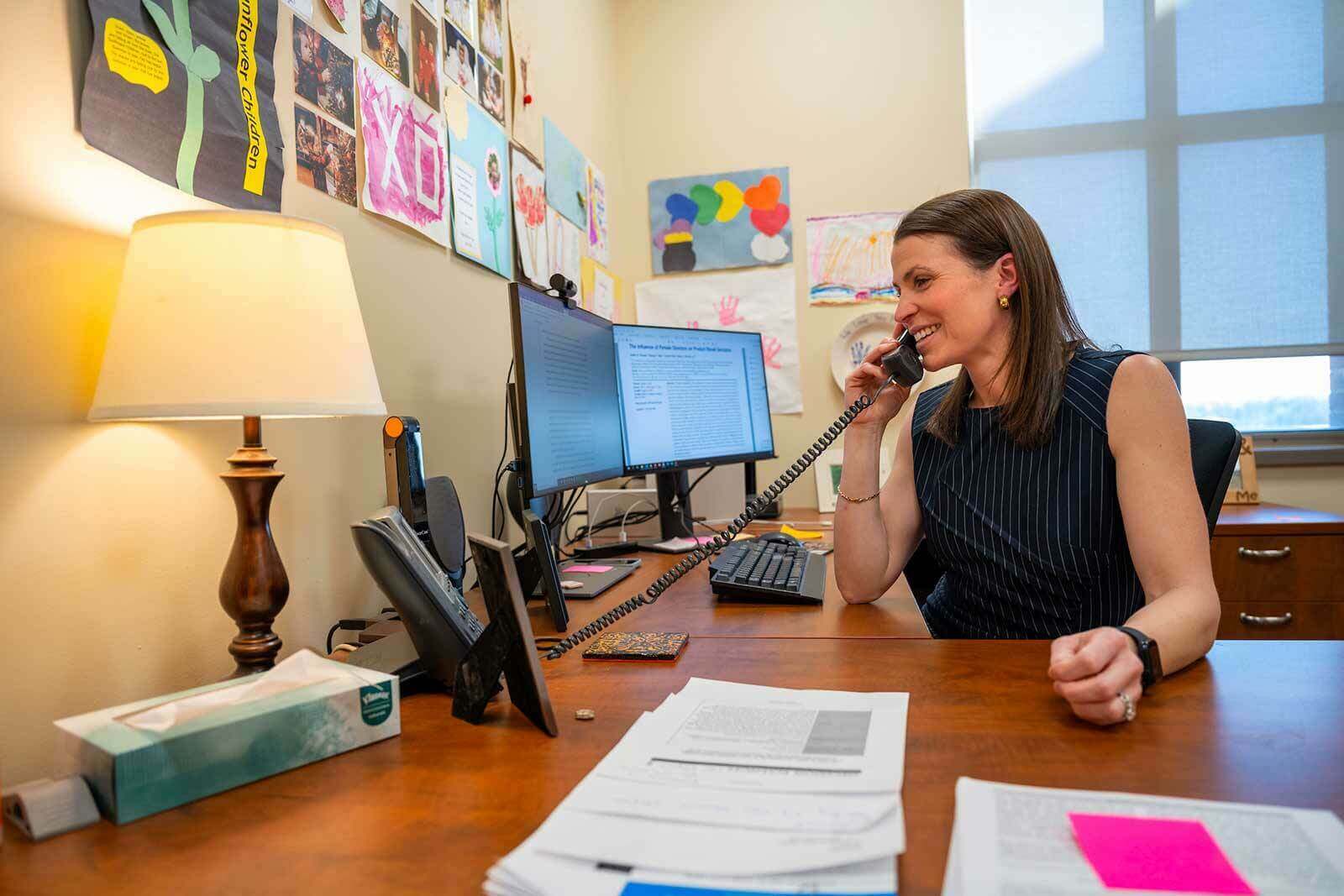
Getting from A to B
Kaitlin Wowak
Mendoza College of Business
Two years ago, discussion of the supply chain was mostly reserved for business classes or corporate boardrooms. But as cracks in the system revealed in the spring of 2020 grew into full-blown canyons by the fall of 2021, supply chain became a household term. It’s a newfound fame (or infamy) that has vaulted supply chain management to a sort of topical celebrity status, with a renewed interest even where the field was commonly discussed.
“I don’t think a lot of people knew what supply chain management was before,” says Kaitlin Wowak, associate professor of IT, analytics and operations. “In class, I used to have to sell students on the importance of the supply chain. Now, I don’t have to.”
“Having more perspectives helps everybody succeed. Whether it’s sustainability or just enhanced performance over time, it just makes people more well-rounded. Gender equality can make everyone more successful tomorrow.”
It also means that Wowak, an expert in strategic supply chain management, is more in-demand than ever, fielding requests for media interviews and presentations with all the efficiency of a major distribution center.
“Efficient” is an apt descriptor when it comes to Wowak; it’s a trait that has marked her path starting with her upbringing in Gig Harbor, Washington, near Tacoma. In high school, Wowak enrolled in a program called Running Start, which enabled her to combine her last two years of high school and first two years of college. As a result, she enrolled as a junior at the University of Florida at age 17, and graduated summa cum laude with a degree in finance at 19.
While studying at UF, Wowak had something of an epiphany that ultimately charted her course for the future.
“It was the moment I realized, ‘This is exactly how my brain thinks,’” she recalls. “We had a group project in class that was optimizing the scheduling [of shipment] of different bottles of wine. I did it all by myself. I told the group, ‘I got this, don’t even worry about it.’ It was exactly how my brain thought; it made so much sense to me. I knew I found my passion.’”
Mindful of the advice of family members who encouraged pursuing postgraduate degrees and a career in higher education, Wowak rounded out her studies at Johns Hopkins University and Penn State University before joining the faculty in the Mendoza College of Business in 2012. She has since earned a reputation as a driven, goal-oriented scholar and an accessible instructor. She is the winner of the 2019 Journal of Operations Management Jack Meredith Best Paper Award, the 2017 James Dincolo Teaching Excellence Award and the 2020 Outstanding Professor Award for the Master of Science in Management program.
This is a partial list of achievements, but it portrays Wowak’s potent effectiveness. She pursues her work today with the same determination as the teenage finance major who was volunteering to tackle group projects alone, only now with colleagues in Mendoza and across the country.
Notre Dame Stories Podcast: What's going on with the supply chain?
Notre Dame Stories Podcast features Kaitlin Wowak, associate professor of IT, analytics, and operations in the Mendoza College of Business on the supply chain.
“I don’t want to say I’m obsessed with being productive, but I really love the feeling of accomplishing things,” she says. “I love working on projects … [with] those co-authors that you vibe with really well, and we’re really productive together. I love that connection.”
While understanding and explaining the logistical complexities of supply chain disruption has occupied a good share of her time over the last two years, Wowak’s primary research focus is product recalls and how these disruptions can facilitate organizational learning and capability development to mitigate the impact of future disruptive events.
“One of my favorite papers to date looked at female board representation,” Wowak says. “What we found was that when you have more females on your board of directors, you issue class-three recalls much more often than when you have all-male boards. In addition, when you have female board representation, you issue recalls of the high-severity, life-threatening product issues significantly faster than when you have all-male boards.
“That finding has important implications because there are a lot of initiatives around mandating females be a part of boards of directors, so it shows a tangible impact of that decision,” she says.
“Women bring a different perspective of things, usually. They’re aware of different things that may go unnoticed when you have all men there.”

The success of women in the workplace is an imminently relatable subject for Wowak, herself a wife and mother of two girls. She says she is able to achieve balance because of a supportive environment at Mendoza, a transparent approach with her students, and yes, a healthy dose of her signature efficiency. On the first day of classes, Wowak will often show pictures of her family to her students and explain when she’s available to respond to emails and what times are reserved for her family. It’s an example that is not lost on her students or her children.
“My kids come to the office with me, they run around the halls,” she says. “They’ll have play meetings or they’ll practice teaching. They even talk about being little bosses. They say, ‘Mom, I’m a boss like you.’ I think it’s really important for them to see me in this role. There’s something special about when your mom’s a professor and I think they love that about me, because they ask if they can be in my class one day. Being a mom has been more rewarding than I ever expected.”


As Wowak’s research shows, enhancing gender equality through increasing the number of women in leadership roles has near-term positive implications. But when girls see women in positions of authority, the impact can be generational and transformational. The United Nations’ theme for International Women’s Day 2022 places special emphasis on the importance of gender equality in the area of sustainability. While there is an element of environmental stewardship present in Wowak’s field of study (e.g., a more efficient supply chain would presumably include more efficient transportation), she notes that equality serves a universal good.
“Having more perspectives helps everybody succeed,” Wowak says. “Whether it’s sustainability or just enhanced performance over time, it just makes people more well-rounded. Gender equality can make everyone more successful tomorrow.”
